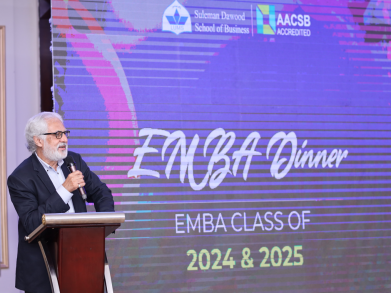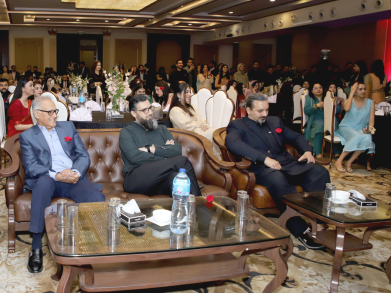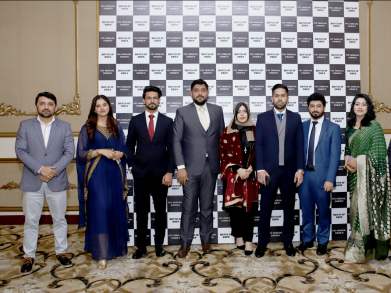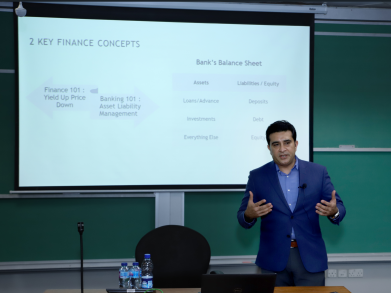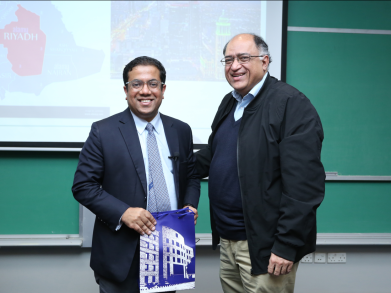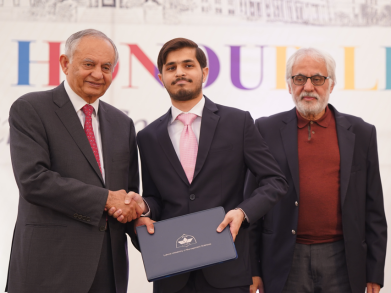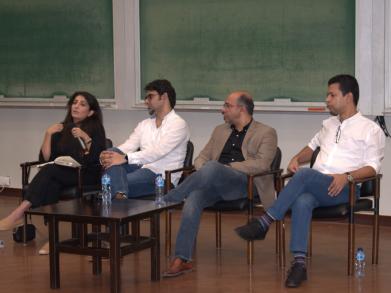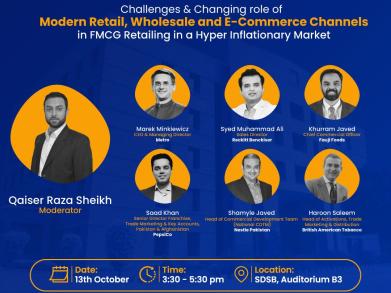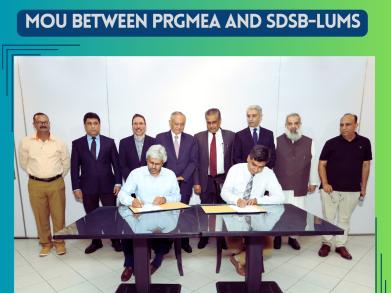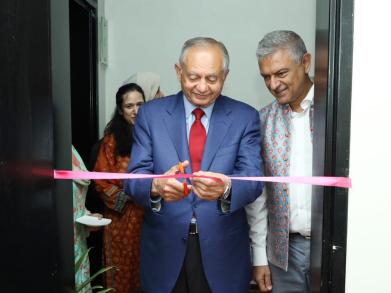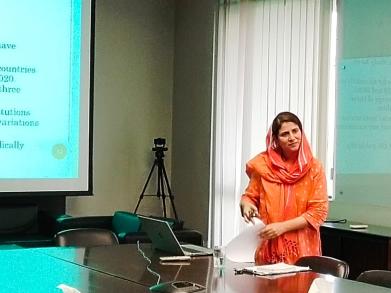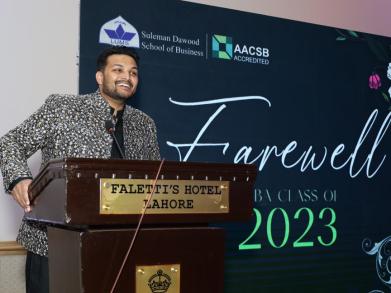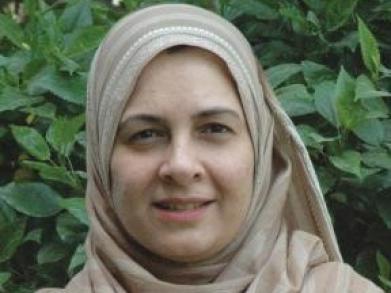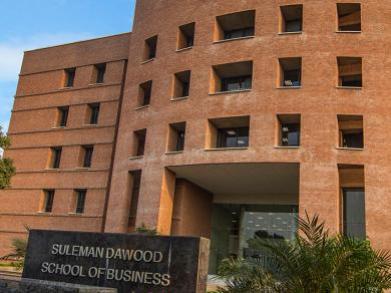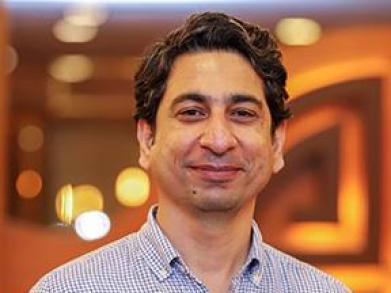Fireside Chat with Dr. Albert Napoli
On Friday, 27 December 2024, the Suleman Dawood School of Business (SDSB) hosted an engaging fireside chat on Visualizing Family Business Dynamics, featuring Dr. Albert Napoli, Senior Lecturer in Entrepreneurship at the University of Southern California, and SDSB Associate Dean Academics, Dr. Shakeel Sadiq Jajja.
The conversation explored the complex dynamics of family business operations, addressing key issues such as leadership transitions, intergenerational collaboration, and strategies for fostering emotional and financial sustainability. Dr. Napoli’s unique perspective provided valuable insights into the complexities of family businesses. Drawing from his extensive experience consulting for family businesses globally, Dr. Napoli shared practical strategies and lessons from his work in helping businesses navigate the challenges of succession and governance.
During the conversation, Dr. Napoli addressed the common governance challenges family businesses face. He noted that one of the most significant issues is a lack of formal governance structures, which can create confusion around decision-making and succession. Many family businesses operate with informal, often ambiguous, governance models, leading to conflicts and missed opportunities. He emphasised the importance of setting up clear governance structures, such as family councils or advisory boards, where family and non-family members can participate and ensure transparent decision-making. According to Dr. Napoli, such models help mitigate risks and allow smoother leadership transitions.
As the conversation shifted, Dr. Napoli spoke about how key priorities evolve as a family business transitions from one generation to the next. He explained that while the first generation often focuses on building the business, subsequent generations tend to face shifting goals. For instance, the second and third generations may prioritise scaling the business or diversifying into new ventures. As priorities evolve, the family’s dynamic also changes, potentially causing friction. Dr. Napoli advised that families anticipate these shifts and start discussing long-term goals and leadership roles early to avoid tensions during transitions. Such preparation, he noted, could ensure that business decisions are aligned with family values and vision, even as each generation has different aspirations.
Navigating difficult conversations in family businesses was another key area of discussion. Dr. Napoli acknowledged that, in family-run companies, emotions and personal interests often drive decision-making, which can complicate business matters. To manage this, he suggested a few strategies, such as fostering a culture of open communication. By encouraging family members to express their concerns constructively and respectfully, businesses can resolve conflicts and maintain focus on organisational goals. He also recommended bringing in third-party facilitators for sensitive topics, helping guide discussions and mediate differences in perspective.
Another point of discussion revolved around integrating non-family executives into family businesses. Many enterprises rely on family talent and can be hesitant to bring in outside experts, fearing they might disrupt established dynamics or challenge traditional business practices. Dr. Napoli explained that family businesses must integrate non-family executives gradually. This can be done by positioning them as partners rather than outsiders. When non-family executives are involved in decision-making from the outset and given clear roles and responsibilities, trust can be built, and they are more likely to contribute effectively to the business’s growth.
A frequent dilemma for family businesses is balancing the needs of the family, the business, and the ownership. Dr. Napoli acknowledged that this can be difficult, as decisions that benefit one area may be detrimental to others. He noted that the key to managing these different fronts is establishing a governance model that clearly defines roles, limits conflicts, and ensures transparency in decision-making processes. While it’s difficult to avoid trade-offs, businesses that manage to balance these aspects often benefit from well-defined guidelines and proactive communication.
The fireside chat also touched upon what makes certain family businesses succeed in both growth and unity. Dr. Napoli pointed out that the most successful family businesses maintain strong communication, a clear vision for the future, and shared values that transcend generational divides. For these businesses, aligning family goals with business strategy is paramount. He shared examples of companies that have not only managed to expand successfully but have also maintained family cohesion by making communication a priority and providing the next generation with both the technical skills and emotional intelligence required to navigate the complexities of leadership.
Drawing from his global experience, Dr. Napoli also highlighted some key cultural differences in how family businesses operate in the East compared to the West. In Eastern cultures, he noted, there is often a deeper respect for hierarchy and tradition, which significantly impacts how decisions are made and how leadership is passed down through generations. On the other hand, in Western cultures, there tends to be a greater focus on merit and professional management. However, both regions face similar challenges, especially when it comes to governance models and succession planning. The differences are primarily in how families perceive authority and how open they are to outside expertise, but the core challenges remain consistent.
Dr. Napoli’s use of genograms to visualise family relationships and histories featured prominently in the discussion. He explained how these tools can be instrumental in revealing patterns that influence both succession planning and conflict resolution within family businesses. By mapping out the family system, genograms can uncover recurring issues, such as unresolved conflicts or behavioural patterns, that might otherwise go unnoticed. This helps family members understand the deeper issues and allows for more informed decision-making regarding leadership transitions and governance.
As the conversation drew to a close, Dr. Napoli offered his key advice for family businesses: invest in open communication, start planning for the next generation early, and align the family’s values with the company’s business strategy. He emphasised that these elements are essential to creating a sustainable and lasting legacy. Dr. Napoli segued into his upcoming presentation, where he would dive deeper into the frameworks and tools available for family businesses to navigate generational transitions and conflict management effectively.
The chat ended with a lively audience engagement segment, where attendees could ask questions and reflect on how they could apply the insights shared to their own family enterprises. The session left everyone with valuable takeaways, as well as a renewed understanding of the importance of balancing tradition with innovation in family business management.
Dr. Jajja also brought a compelling perspective to the discussion, drawing on his extensive academic expertise and real-world experience in operations and supply chain management. He emphasised the operational complexities that family businesses face, such as balancing the need for efficiency with the deeply rooted traditions that often guide their decision-making processes. Dr. Jajja shared how factors like resource optimisation, technological innovation, and strategic planning play a crucial role in driving the success and sustainability of these businesses.
The fireside chat fostered a vibrant exchange of ideas, with Dr. Jajja and Dr. Napoli complementing each other’s perspectives to present a well-rounded view of what makes family businesses thrive. They explored how a blend of emotional intelligence, structured governance, and forward-thinking leadership can empower families to overcome challenges and seize growth opportunities. Together, they highlighted the importance of mutual respect and shared goals between generations, ensuring that each stakeholder contributes to building a strong and enduring legacy.
Key figures attended the event, including Shahid Hussain, the Rector of Lahore University of Management Sciences (LUMS), and Abdul Razak Dawood, Pro-Chancellor of LUMS. Dr. Fazal Jawad, Dean of the Suleman Dawood School of Business, also participated in the discussion, emphasising the importance of such knowledge-sharing opportunities for students, faculty, and the broader business community.
This event reinforced SDSB’s commitment to fostering meaningful dialogue on contemporary business challenges, bridging theoretical insights with practical applications. By addressing the multifaceted dynamics of family businesses, the session provided attendees with actionable strategies to navigate complexities and seize growth opportunities. The event reaffirmed the significance of nurturing leadership across generations, cultivating open communication, and aligning family values with business strategies to build resilient, future-ready enterprises. It also highlighted SDSB’s pivotal role in shaping thought leadership and providing a platform for impactful discussions that benefit students, faculty, and the broader business community alike.




